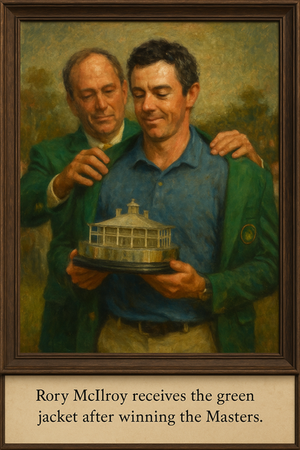Fourteen Years, Four Double Bogeys, and a Final Masters Win to Make History
- Andrew Patterson
- Apr 15
- 4 min read
This morning, the full moon sat effortlessly in the turquoise sky above the western horizon. Just hovering there, quiet and bright. It reminded me of something we forget in a world of instant results: the most meaningful things take time.
Just ask Rory McIlroy.
He first teed it up at Augusta as a wide-eyed 19-year-old in 2009 and tied for 20th. Two years later, he’d win his first Major, the U.S. Open. Next came the 2012 and 2014 PGA Championships, along with the 2014 Open Championship—a double major season.
And then came the long wait for Augusta.
This weekend, on his 14th attempt, Rory finally won the Masters, completing the elusive career Grand Slam. Fourteen years of heartbreaks, hope, near-misses, and the inevitable question from journalists every spring: “Will it be this year?”
Yet he kept coming back. Sometimes that final puzzle piece barely eluded him—sometimes, it slipped away painfully. But now, finally: history. A green jacket. His name etched into golf’s most exclusive circle.
And here’s the part I can’t stop thinking about: he won it with four double bogeys.
To put that into perspective—no one has ever won the Masters after even three. That stat alone speaks volumes about his mental resilience and emotional growth.
And then, consider the added pressure. A first Masters win is daunting enough.
But this one would join him with just five others in history to complete The Grand Slam:
Gene Sarazen (1935),
Ben Hogan (1953),
Gary Player (1965),
Jack Nicklaus (1966) and
Tiger Woods (2000).
The stakes were enormous.

“I’ve been trying to stay in my own little world and keep it as simple as possible… not get carried away with anything.”
This wasn’t a fairytale week. He didn’t have four flawless rounds. It wasn’t a display of untouchable perfection. He won it like a human being. Messy in moments, but steady in spirit. That’s a story worth sitting with.
Success Doesn’t Always Arrive on Schedule—But It Comes to Those Who Show Up
Rory’s win isn’t just about talent—we’ve always known he had that. His four other majors are a testament. But this was about something more: growth.
It was about sticking with something long after the world started asking why you haven’t finished the job yet.
It was about patience—not the passive kind, but the kind that keeps you coming back, quietly sharpening, quietly believing.
It’s easy to romanticize resilience after the win. But for 13 Masters, Rory left empty-handed and heart-broken. And still, he showed up every spring in Augusta—expectation heavy, eyes wide open, game ready. Fourteen years is a long time to carry unfinished business. But some things need time.
Time is not the enemy—it’s part of the process.
Four Double Bogeys and Still Standing
He could’ve unraveled. Plenty of players would have. Augusta has a way of exposing nerves and cracking composure—just ask Greg Norman, who gave up a six-shot lead in '96 and lost by five. Or ask a young Rory himself, who hit a wayward tee shot on 10 in 2011 that triggered a full collapse, carding an 80 and finishing T15.
But this year, Rory stayed composed. He spoke earlier in the week about how he’s learned to deal with setbacks better—and you could see that in real time.
His third double bogey of the week came on the very first hole Sunday. But birdies on 3 and 4 brought him right back to -12.
That alone is a lesson. We don’t need to be perfect to succeed. We just need to keep going, to trust ourselves in the next moment, to breathe through the noise and keep swinging.
Golf really is a microcosm of life—setbacks will happen. But how you respond to them can either make or break your round. Rory could’ve imploded—again.
Especially with the added weight of the Grand Slam hanging over him.
Standing on the 13th tee, he had a three-shot lead. But a disastrous approach into the water led to a double bogey on a hole he should’ve birdied. At the same time, Justin Rose birdied 16 to tie for the lead.
The seesaw swung hard. Everyone wondered—was another Masters slipping through his fingers?
Enter the second shot on the par-5 15th: an extraordinary strike that bent around the tree, soared over the water, and landed six feet from the hole. The stuff of legends. His demons looked silenced.
And then… he missed the eagle putt. Settled for birdie. Still tied.
The final three holes didn’t offer much comfort. Rose bogeyed 17 to fall back to -10, then holed a monster putt on 18 to claw back to -11 and wait. All he could do was watch.
Rory’s own finish kept the rollercoaster going.
Birdie on 17 to reclaim the lead. Bogey on 18 after missing a short putt—tied again.
Sudden death playoff. Fourteen years of pressure sitting in his hands.
Both men hit perfect drives. Rose struck first, his second shot landing 15 feet from the hole. Rory answered—coolly—his ball landing just three feet away.
Rose missed. Rory didn’t.
As the ball dropped, so did Rory—to his knees. Overcome with emotion, relief, joy, and years of weight finally released.
A Different Augusta, A Different Rory
This year’s Augusta looked different. Hurricane Helene—yes, the same one that swept through Asheville—had ravaged the course. Massive trees lost. Familiar shadows gone. A place known for never changing had changed.
And yet—it was still Augusta. Still sacred. Still beautiful.
Maybe that’s the metaphor I’ll carry with me. Rory and Augusta shared a similar arc: scarred, but still standing. Changed, but still great.
A little more open. A little more real. And maybe that’s why this was the year. Not because the stars aligned—but because the scars had healed with wisdom.
Change doesn’t mean the end of greatness. It often makes greatness possible.
Keep Showing Up
Watching Rory win after all these years reminded me of something that feels especially right on a Monday morning:
There is power in persistence. There’s grace in not giving up on something you care deeply about. Even when it’s hard. Even when it takes years. Even when the world casts you aside among the “what ifs.”
Maybe you’re carrying your own 14-year pursuit. Maybe you’re navigating your own version of double bogeys. Or standing in the aftermath of your own Hurricane Helene.
If that’s you—keep going. Keep becoming. The moon still rises. The trees will grow back.
And eventually, you may just get your Grand Slam too.








Comments